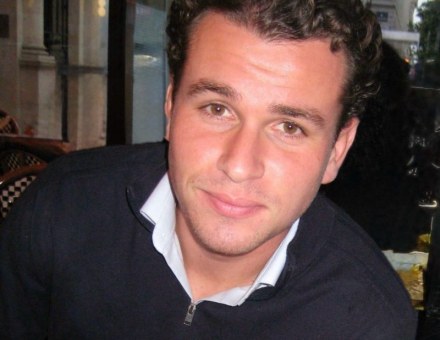Current MSc in Sports Industry Management student Louis Coppi recounts his journey as a tennis fanatic studying in the US to embarking on Masters-level studies at emlyon featuring an eye-opening team project designed to develop motor sport culture in West Africa.
Editor’s note: This program is evolving into the MSc in Sports, Entertainment & Lifestyle for the 2025 intake.
What brought you to emlyon to study the MSc in Sports Industry Management?

For me, the program was perfectly aligned with my background, having started playing tennis at the age of 4 and then competitively from 15. What had begun as a hobby eventually became a lifestyle that I continued to pursue when I moved to the US for my Bachelors studies in International Business.
Towards the end of that stage in my student life I was faced with the decision of staying in the US or coming back to Europe, plus I wanted to discover sport from another perspective – the business side as opposed to that of an athlete that I had already been enjoying for many years. I wanted to get involved in the organization of sport, in a deeper and more meaningful way.
The performance of emlyon in rankings was an obvious and important draw, plus I knew people who had already taken the MSc and had great things to say about it. The faculty teaching the program are also a major plus since many of them have previously worked in the industry before going on to educate about it.
What are your first impressions of the program?
The classes are a manageable size, meaning you benefit even more from the teaching and teachers. You get to really know them, they are always on hand to answer our questions. As for the cohort itself, we’re all driven by our shared passion for sports and making a potential career within the industry. This cohesive spirit was strengthened by a study trip to London and then more recently the Fédération Internationale de l’Automobile (FIA) project on which I worked.
How did the FIA project arise?
It started with a pitch at the school by two different organizations – one is a highly renowned global sports brand and the other the FIA. The latter appealed to me the most so, along with four classmates, I formed a working group for the project. We had a choice between China, India, West Africa, and the US on which to concentrate our research, analysis and recommendations. Our decision to work on West Africa was motivated by the relative novelty of studying such a part of the world and the precious little existing data on their case. The challenge this presented was all part of the fun and interest of it.
West Africa is a place where motor sport culture is not so developed as in other parts of the world, so analyzing the likes of Senegal and Cameroon was especially interesting, plus one of our team members hails from the latter of those two countries, adding a slightly personal touch to our initiative. We looked very closely at infrastructure in the relevant countries, applying many of the learnings we’d already obtained from other courses that form part of the MSc curriculum.
What methodology did you adopt?
We were assisted by a tutor when required, working on the project from September to early December. He is a professional working actively in the industry and has been collaborating on a regular basis with emlyon for the past 2-3 years. Us five team members started working very closely together before then dividing up tasks between us, conducting our own individual research and then coming back together to share thoughts and ideas. Sometimes we needed to streamline our way of working, which was all part of the learning process. We had to think strategically, performing market analyses into areas where automobile sports are only starting to emerge.
What were the main takeaways from the FIA project?
It was the first time I’d worked on a real-world problem of this nature. We all had to structure our thinking rather than just coming up with random new ideas. We were able to draw upon some of the course content such as Sports Marketing to help guide the process to come up with a proposal for the development of a motorsport culture in West Africa via Formula One.
In December we went to the FIA headquarters in Paris to deliver our presentation and answer questions in front of 10 representatives of the federation. They gave a lot of critical but constructive feedback and showed keen interest in our proposal.
What recommendations did you make?
The first angle from which we approached the issue was infrastructure, namely improving people’s access to the sport in the region. We also floated the idea of West Africans being able to go to Europe via the UN to experience motorsport up close on another continent and attend meetings. We also looked closely at countries such as Senegal where existing racetracks have been going to waste and where financing is needed to bring things up to standard again, including on the safety level.
Presenting in front of such industry representatives was initially stressful but I can say honestly that I’ve gained a lot of self-confidence as a direct result. I’ll certainly be more capable of putting myself forward in the near future when I take my first professional steps into sport. For this reason, among many others, I can’t recommend working on such a project and taking such a program strongly enough.
In 2025, the MSc in Sports Industry Management will become the MSc in Sports, Entertainment & Lifestyle, a two-year program focused on sports and entertainment marketing. Combining digital technologies and strategic insights, it prepares students for careers in the evolving sports, entertainment, and lifestyle industries.


